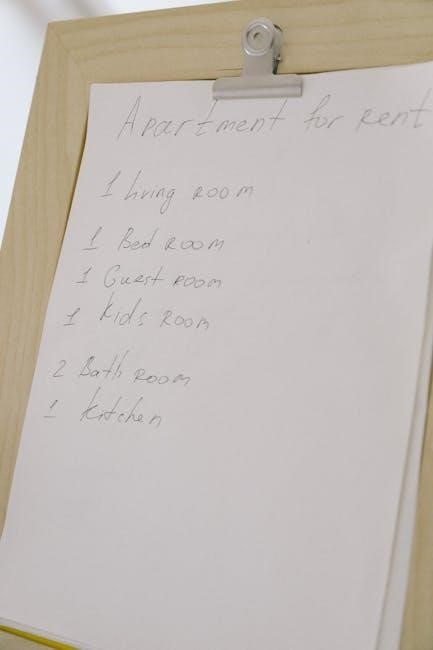Understanding Tax Delinquent Property Lists in Oklahoma
The 2024 Oklahoma Tax Delinquent Property List is a comprehensive document detailing properties with unpaid taxes‚ offering insights into ownership details‚ tax amounts‚ and legal implications․ It serves as a vital resource for investors and local governments‚ ensuring transparency and accountability in property tax management․
What Are Tax Delinquent Properties?
Tax delinquent properties in Oklahoma are those with unpaid property taxes‚ resulting in their inclusion on the 2024 Tax Delinquent Property List․ These properties have overdue tax liabilities‚ which can lead to legal consequences for owners․ The list‚ managed by the County Treasurer’s Office‚ details owner information‚ tax amounts owed‚ and property specifics‚ serving as a resource for authorities and investors to address tax issues and potential property acquisitions․
Why Properties Become Delinquent
Properties in Oklahoma become tax delinquent primarily due to unpaid taxes‚ often resulting from financial hardships‚ forgetfulness‚ or communication issues․ Financial difficulties‚ such as job loss or medical emergencies‚ can prevent owners from paying taxes․ Forgetting to pay or not receiving tax bills‚ possibly due to address changes‚ also contributes․ Additionally‚ intentional avoidance‚ disputes over assessments‚ natural disasters impacting property value‚ and economic downturns affecting income can lead to delinquency․ Lack of awareness about tax importance and consequences further exacerbates the issue․
2024 Oklahoma Tax Delinquent Property List Overview
The 2024 Oklahoma Tax Delinquent Property List provides a comprehensive record of properties with unpaid taxes‚ detailing each property’s location‚ tax owed‚ and legal status․
Key Features of the 2024 List
The 2024 Oklahoma Tax Delinquent Property List includes detailed property descriptions‚ tax amounts owed‚ and legal statuses․ It covers properties across all Oklahoma counties‚ providing updated information for 2024․ The list highlights parcels with unpaid taxes‚ offering transparency for public review․ It also includes parcel numbers‚ addresses‚ and tax years delinquent․ This resource is invaluable for investors‚ researchers‚ and local authorities needing comprehensive tax delinquency data․
How the List is Compiled
The 2024 Oklahoma Tax Delinquent Property List is compiled by the Oklahoma County Treasurer’s Office using tax records and legal notices․ Properties with unpaid taxes are identified‚ verified‚ and cataloged․ The list is prepared annually‚ reviewed for accuracy‚ and updated to reflect current tax statuses․ It ensures compliance with state laws and provides a transparent record of delinquent properties for public access and administrative purposes․

Legal and Financial Implications
The legal and financial implications of tax delinquent properties in Oklahoma involve penalties‚ interest‚ and potential property loss․ Compliance with tax laws is crucial for owners and buyers to avoid further legal consequences․
Consequences for Property Owners
Property owners facing tax delinquency in Oklahoma may incur penalties‚ interest‚ and additional fees․ If unpaid‚ taxes can lead to property liens‚ tax sales‚ or auctions․ Owners risk losing ownership rights‚ and delinquency can harm credit scores․ Prompt payment is crucial to avoid legal actions and financial setbacks․ Ignoring delinquency notices escalates consequences‚ potentially resulting in property loss and further legal repercussions․
Opportunities for Investors
Investors can capitalize on Oklahoma’s 2024 tax delinquent property list by acquiring properties at discounted rates or purchasing tax liens․ These opportunities offer potential for high returns through property flipping‚ rental income‚ or redeeming liens․ Auctions provide a platform for competitive bidding‚ allowing investors to secure undervalued assets․ Proper research and due diligence are essential to maximize profits and mitigate risks in this lucrative market․

Accessing the 2024 Tax Delinquent Property List
The Oklahoma 2024 tax delinquent property list can be accessed through official county treasurer websites or third-party platforms offering downloadable PDF versions for public review․
Official Sources for the PDF List
The official 2024 Oklahoma tax delinquent property list in PDF format is primarily available through county treasurer websites․ The Oklahoma Tax Commission also provides resources․ Visit the County Treasurer’s office website‚ navigate to the “Tax Collections” or “Delinquent Taxes” section‚ and download the latest PDF list․ Ensure to verify the source’s authenticity to access accurate and up-to-date information․
Third-Party Platforms and Resources
Third-party platforms like Auction․com and TaxLiens․com offer access to Oklahoma’s 2024 tax delinquent property list in PDF format․ These sites often provide searchable databases‚ filters‚ and detailed property information․ They cater to investors and researchers‚ offering convenient access to delinquency data․ Be cautious of fees and ensure the platform is reputable for accurate and reliable information․

Details Included in the List
The Oklahoma 2024 tax delinquent property list PDF includes property owner information‚ outstanding tax amounts‚ parcel numbers‚ and legal descriptions of properties with unpaid taxes․
Property Information and Tax Amounts
The Oklahoma 2024 tax delinquent property list includes detailed property information‚ such as parcel numbers‚ legal descriptions‚ and assessed values․ It also outlines the exact tax amounts owed‚ including penalties and interest․ This data helps identify properties with delinquent taxes and provides clarity on the financial obligations associated with each listing‚ aiding potential investors in evaluating opportunities;
Owner Details and Contact Information
The Oklahoma 2024 tax delinquent property list typically includes owner details‚ such as names‚ mailing addresses‚ and other contact information․ This data assists potential buyers in communicating with property owners regarding tax owed or redemption options․ Accurate owner information is crucial for due diligence and ensuring compliance with legal procedures before pursuing property acquisition or tax lien investments․

County-Specific Information
Oklahoma’s 77 counties maintain unique tax delinquent lists‚ reflecting local property values and tax rates․ Each county treasurer’s office manages delinquencies‚ offering detailed reports online․
Oklahoma County Treasurer’s Role
The Oklahoma County Treasurer manages tax collections‚ overseeing delinquent property cases․ They prepare and publish the annual delinquent list‚ ensuring compliance with state tax laws․ The treasurer conducts tax sales‚ handles redemption payments‚ and maintains detailed records․ Their office provides public access to delinquency data‚ aiding transparency and investor research․ This role is crucial for local revenue and property management efficiency․
Other Counties’ Delinquent Property Listings
Beyond Oklahoma County‚ each county in Oklahoma compiles its own delinquent property list․ County treasurers are responsible for preparing and publishing these lists annually․ The process mirrors Oklahoma County‚ with similar deadlines and redemption periods․ Investors and researchers should review each county’s specific guidelines for accuracy․ These lists are typically available on official county websites or through local treasurer offices‚ ensuring statewide transparency․

Purchasing and Bidding Guidelines
Purchasing tax-delinquent properties in Oklahoma involves structured processes‚ including public auctions and upset bids․ Buyers must adhere to county-specific rules‚ payment terms‚ and legal requirements to ensure compliance․
How to Buy Tax Delinquent Properties
To purchase tax-delinquent properties in Oklahoma‚ buyers must first research the official 2024 list and identify properties of interest․ Understanding payment methods‚ such as cash or certified funds‚ is crucial․ Buyers must also register for auctions‚ adhere to legal requirements‚ and ensure compliance with county-specific bidding processes․ Contacting the county treasurer’s office for detailed guidelines is recommended․
Understanding the Auction Process
The auction process for tax-delinquent properties in Oklahoma typically involves live or online bidding․ Properties are sold to the highest bidder‚ with a minimum starting bid often set by the county․ Bidders must pay immediately upon winning‚ usually in cash or certified funds․ Auctions are competitive‚ and buyers should research properties beforehand to ensure informed decisions․
Tax Sale and Resale Process
Tax sales involve selling properties with unpaid taxes to recover lost revenue․ Resale occurs if properties remain unredeemed post-auction‚ offering new opportunities for buyers to acquire them․
Timeline for Tax Sales in 2024
The 2024 Oklahoma tax delinquent property list will be published in March 2024․ Properties with unpaid taxes are advertised for 30 days before the auction․ Tax sales typically occur in May‚ with bidding starting at the total owed․ Property owners have a redemption period after the sale to reclaim their property by paying taxes‚ fees‚ and interest․
Resale Procedures for Unredeemed Properties
Unredeemed properties in Oklahoma are resold through a public auction‚ typically within 12 months of the initial tax sale․ The County Treasurer handles the resale process‚ advertising the properties for at least 30 days․ Buyers must pay the full amount due‚ including taxes‚ fees‚ and interest․ Properties not sold are held by the county until future auctions or disposal․

Investment Opportunities and Risks
Investing in tax-delinquent properties offers potential high returns but involves risks like property condition‚ market fluctuations‚ and legal complexities․ Buyers must weigh rewards against challenges carefully․
Benefits of Investing in Tax Liens
Investing in tax liens offers attractive returns through interest and penalties‚ providing a steady income stream․ Tax liens often prioritize investors over other claims‚ ensuring security․ Properties can be acquired at discounted rates if owners fail to redeem‚ offering long-term appreciation potential․ This low-risk investment strategy aligns with market trends‚ making it a viable option for portfolio diversification and financial growth in Oklahoma’s real estate market․
Potential Pitfalls to Consider
Investing in tax delinquent properties involves risks‚ including property condition uncertainties and hidden liens․ Title issues may require legal resolution‚ adding costs․ Market demand fluctuations could affect resale value․ Budgeting for renovations and holding costs is crucial․ Additionally‚ the redemption period may delay returns‚ and auction competition can drive up prices‚ potentially reducing profit margins for investors in Oklahoma’s tax lien market․
Historical Data and Trends
Previous Years’ Delinquency Rates
Analyzing historical data reveals declining delinquency rates from 2015 to 2023‚ with a slight uptick in 2024 due to economic pressures and policy changes․
Oklahoma has seen fluctuating tax delinquency rates in recent years‚ with a noticeable decline from 2020 to 2023․ Historical data shows a peak of 12% in unpaid taxes during 2020‚ dropping to 9% by 2023․ This trend reflects improved collection efforts and increased awareness among property owners․ Such patterns help investors and officials anticipate future delinquency levels and plan accordingly․
Market Trends in Tax Delinquent Properties
The 2024 Oklahoma tax delinquent property list reveals rising trends in property delinquencies due to economic challenges and increased property tax rates․ Investors are showing heightened interest in these properties‚ driven by potential bargains․ Counties like Oklahoma and Tulsa are experiencing higher delinquency rates‚ offering opportunities for tax lien investing․ However‚ market trends also indicate increased competition and potential risks associated with distressed properties․
Strategies for Investors
Investors should conduct thorough property research‚ prioritize high-potential locations‚ and understand auction processes to maximize returns while managing risks associated with tax delinquent properties in Oklahoma․
Researching Properties Effectively
Effective research is crucial when evaluating tax delinquent properties in Oklahoma․ Investors should utilize county assessor databases and GIS maps to identify properties․ Reviewing property history‚ tax amounts‚ and owner details ensures informed decisions․ Site visits and title checks are essential to assess condition and potential liens․ Leveraging the Oklahoma Tax Commission’s resources can also provide valuable insights for strategic investments․
Managing Risks in Tax Lien Investments requires careful due diligence and strategic planning․ Investors should assess property values‚ tax amounts‚ and potential redemption chances․ Understanding Oklahoma’s tax sale laws is crucial to avoid legal pitfalls․ Diversifying investments across multiple properties can mitigate risks․ Evaluating local market conditions and property conditions ensures informed decisions․ Budgeting for additional costs‚ like liens or repairs‚ is essential for long-term profitability․

Legal and Regulatory Considerations
Understanding Oklahoma’s tax sale laws‚ buyers must comply with state statutes and county treasurer regulations․ Compliance with legal standards ensures valid transactions and avoids penalties․ Consulting legal experts is advisable for proper adherence to all requirements․
State Laws Governing Tax Sales
Oklahoma state laws regulate the tax sale process‚ ensuring transparency and fairness․ Properties with unpaid taxes are sold at public auctions‚ with proceeds covering delinquent taxes and fees․ The Oklahoma Statutes Title 68 outlines procedures for notices‚ redemption periods‚ and auction protocols․ Buyers must comply with legal requirements‚ including payment terms and property ownership transfers․ Adherence to these laws is critical for valid transactions․
Compliance Requirements for Buyers
Buyers of tax delinquent properties in Oklahoma must adhere to specific compliance requirements․ Registration with the county treasurer’s office is mandatory‚ often requiring completion of forms and payment of fees․ Buyers must ensure payment is made with certified funds or acceptable payment methods․ Due diligence on property liens and encumbrances is essential․ Attendance at auctions‚ either in person or online‚ is typically required‚ with proper identification and documentation․ Compliance with zoning and land use laws is also necessary․
Role of Government Agencies
The County Treasurer’s Office manages delinquent taxes‚ compiling and updating the list․ The Oklahoma Tax Commission oversees compliance‚ ensuring properties meet legal requirements for tax sales․
County Treasurer’s Office Responsibilities
The County Treasurer’s Office in Oklahoma is responsible for managing tax delinquent properties‚ maintaining accurate records‚ and preparing the annual delinquency list․ They oversee property tax collections‚ notify owners of unpaid taxes‚ and handle redemption payments․ The office also coordinates tax sales and auctions‚ ensuring compliance with state laws․ Their role is crucial for recovering lost revenue and maintaining county financial stability․
Other Government Agencies Involved
Beyond the County Treasurer‚ agencies like the Oklahoma Tax Commission oversee state tax compliance‚ while local County Assessor offices maintain property valuations․ The County Clerk manages public records‚ including delinquency notices․ Additionally‚ the Oklahoma Attorney General may assist in legal proceedings related to unpaid taxes․ These entities collectively ensure the tax delinquency process adheres to state laws and regulations‚ supporting efficient property tax management․

Impact of Technology on Tax Sales
Technology has revolutionized tax sales in Oklahoma‚ enabling online auctions and digital access to delinquent property lists․ automation and data analytics improve efficiency‚ while online platforms enhance transparency and accessibility for investors․
Online Platforms for Tax Lien Auctions
Online platforms have revolutionized tax lien auctions‚ offering convenience and accessibility․ Websites like Bid4Assets and Xcelerate Auctions enable bidders to participate in real-time auctions from anywhere․ These platforms provide detailed property information‚ streamlined registration‚ and secure payment processing․ They also offer tools for tracking auction progress and managing bids․ This digital transformation has increased participation and efficiency in Oklahoma’s tax lien sales․
Digital Tools for Property Research
Digital tools streamline property research for Oklahoma’s 2024 tax delinquent list‚ offering detailed insights․ GIS mapping provides visual property locations and data overlays․ Online databases enable searches by owner‚ parcel ID‚ or location․ Analytics platforms identify trends and investment potential․ Automated valuation models (AVMs) estimate property values․ Mobile apps deliver real-time updates and notifications․ These tools enhance efficiency and accuracy‚ empowering investors to make informed decisions and stay competitive in the market․

Public Benefits of Tax Sales
Tax sales generate crucial revenue for local governments‚ funding public services and infrastructure․ They also encourage property redemption‚ revitalizing neighborhoods and stimulating economic growth within communities;
Revenue Generation for Local Governments
Tax delinquent property sales serve as a vital revenue source for Oklahoma’s local governments․ By auctioning properties with unpaid taxes‚ counties recover lost funds‚ which are then allocated to essential public services‚ schools‚ and infrastructure․ This process not only stabilizes local budgets but also encourages community development by returning idle properties to productive use‚ benefiting both the economy and residents․
Community Development Through Property Redemption
Community development through property redemption revitalizes neighborhoods by returning delinquent properties to productive use․ Redeemed properties can be transformed into public spaces‚ affordable housing‚ or commercial areas‚ stimulating local economies․ This process prevents urban decay and fosters community growth․ Collaboration between local governments and investors ensures that these properties contribute positively to society‚ enhancing overall quality of life and supporting sustainable development initiatives․
Future Outlook for Tax Delinquent Properties in Oklahoma
Oklahoma’s future outlook for tax delinquent properties involves potential increases in delinquencies due to economic shifts․ Policies may adapt to support property owners‚ while technology enhances transparency in tax sales processes․
Expected Changes in Tax Laws
In 2024‚ Oklahoma may see changes in tax laws affecting delinquent properties‚ including potential extensions of redemption periods or adjustments to penalty rates․ Lawmakers are considering measures to streamline the tax sale process and enhance transparency․ Additionally‚ there could be updates to interest rates on tax liens and stricter compliance requirements for buyers․ These changes aim to balance property owner protections with revenue generation for local governments․
Emerging Trends in Property Investment
The 2024 Oklahoma tax delinquent property list highlights growing interest in online auctions for tax lien purchases․ Investors are increasingly leveraging remote bidding platforms‚ reducing the need for in-person appearances․ Data analytics tools are being used to identify undervalued properties‚ enabling smarter investment decisions․ Additionally‚ there is a rise in eco-friendly redevelopment of delinquent properties‚ aligning with sustainability trends․ These shifts present new opportunities for both seasoned investors and newcomers in Oklahoma’s real estate market․



